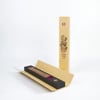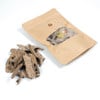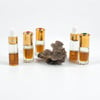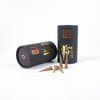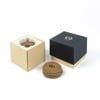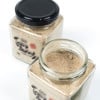For people who are allergic and asthma. What kind of incense should use?
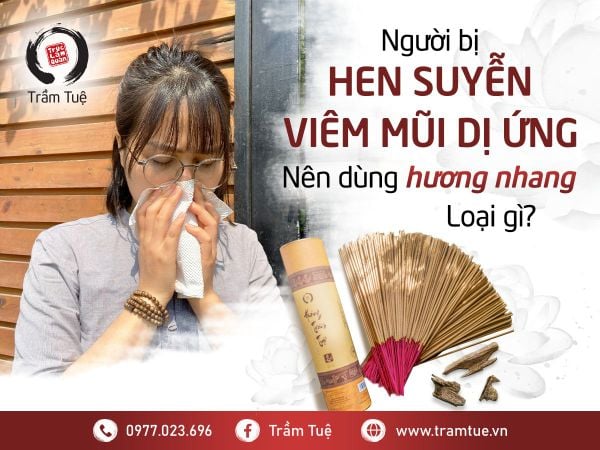
In cold weather conditions, the change of seasons between winter and spring, the temperature difference between day and night is very large as today, plus environmental pollution factors such as smoke, dust, etc., allergic diseases there are many conditions for development and growth. The two most common respiratory diseases are allergic rhinitis and asthma. Allergic rhinitis can affect asthma and vice versa.
Asthma is a disease of the respiratory system in which the airways are narrowed in response to allergens such as dust, pets, mold, pollen, smoke, odors, and dust. , alcohol, tobacco; cold; certain medications or emotional stimulants. Narrow airways cause wheezing, rapid breathing, chest tightness, and coughing. An acute exacerbation of asthma is called an asthma attack. Signs of an asthma attack are shortness of breath and wheezing; intermittent cough that produces clear phlegm; signs of chest tightness, difficulty breathing, exhalation; Tachycardia, sound coming from the bronchi make the patient pale from lack of oxygen and may have chest pain or loss of consciousness. A dangerous asthma attack can stop breathing and can lead to death.
According to the American Academy of Allergy, Asthma & Immunology (AAAAI), about 10-30% of the world's population suffers from allergic rhinitis.
Allergic rhinitis is generally divided into two forms including:
Seasonal allergic (cyclical): Also known as seasonal allergic rhinitis, it usually occurs at certain times of the year.
Perennial Allergic Rhinitis (non-cyclical): A condition in which whenever an allergic factor is encountered, the nose becomes irritated and inflamed.
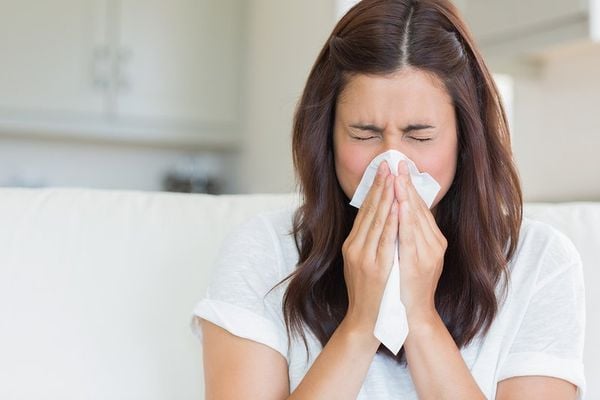
Allergic rhinitis is not life-threatening, is not an infectious disease or requires an emergency, but causes many inconveniences to life and significantly affects the health of the patient (Source image. : Internet)
Dialectical relationship between allergic rhinitis and asthma
Approximately 28-78% of patients with asthma have additional allergic rhinitis. In contrast, about 5-15% of patients with allergic rhinitis have concomitant asthma. Some studies show that asthma - allergic asthma has a prevalence of allergic rhinitis is 99% in adults and 93% in young patients. According to Greisner.W.A - Brown University in the US after 23 years of follow-up recorded: Patients with allergic rhinitis are 3 times more likely to develop asthma later in life than people without the disease.
Although rhinitis is a disease that belongs to otolaryngology, asthma is a respiratory disease, but it is related because of the same airway. According to research, more than 80% of asthma patients have allergic rhinitis, 10-40% of allergic rhinitis patients have asthma. In Vietnam, 35.5% of patients with allergic rhinitis concurrently have asthma. Many people overlook allergic rhinitis, but it is one of the triggers and risk factors for asthma. According to the World Health Organization, asthma is one of the most common chronic diseases in the world, and its frequency is increasing dramatically.
Symptoms of Allergic Rhinitis
Seasonal allergic rhinitis mostly occurs at the beginning of the cold season or the beginning of the hot, humid season, the incidence depends on the weather. Patients often experience the following symptoms:
- Feeling spicy in the nose, itchy nose, leading to constant sneezing
- Eyes stinging, red eyes, itchy dry eyes, watery eyes
- Lots of clear water-like discharge from the nose
- The nasopharyngeal area feels itchy
- Sneezes and runny nose appear more in the morning when you wake up, and then calm down in the evening
- Sometimes I feel short of breath, tired, afraid of light
- In infants and young children may be accompanied by excessive crying due to discomfort; Lazy sucking, loss of appetite and trouble sleeping due to stuffy nose
Causes of Allergic Rhinitis
Allergic rhinitis is caused by the release of histamine in the body when it comes in contact with an allergen. Histamine is a natural chemical that helps protect the body from allergens, but it causes allergic rhinitis. People with allergies (sensitive); family history of allergies; People with asthma and eczema have a higher risk of allergic rhinitis.
Other risk factors for allergic rhinitis include:
Indoor allergy triggers
House dust mites: Common house dust mites causing allergies in Vietnam include: Dermatophagoides Pteronyssinus, Dermatophagoides Farinae, Blomia Tropicalis. House dust mites are concentrated in carpets, bed mattresses, blankets, bed linen, pillows, etc. House dust mites are suitable for environments with high humidity of about 75-80%, temperature of about 25oC -30oC and often cause year-round allergy symptoms
Mold: Grows in damp, dark places. Fungal spores are ubiquitous and often cause year-round allergy symptoms
There are also cats and dogs; feathers, rags from clothes, blankets; perfume cosmetics; shower gel, soap, fabric softener; Food smells, mold...
Airborne allergens: Pollen; feathers, butterflies; rice bushes in the harvest; Smog; smell of garbage, wind, cold air, rain...
Occupational allergens: Pollution in schools; chemicals in factories; yarn in garment factories; animal hair in slaughterhouses; cement dust in material factories; wood dust in carpentry workshops…
The factors that cause allergic rhinitis are hidden everywhere, so the disease is easy to recur. People with a strong immune system may experience milder symptoms. There is also an extremely important allergy-causing factor that few people find out, which is the smoke of incense in the communal house or being lit at home. Specifically, here is the chemical scent, also known as the rolling incense, the scent of perfume.

Incense roll fades - the factor that causes allergic rhinitis that few people discover (Source: Internet)
Prevention of allergic rhinitis
Although allergic rhinitis is not life-threatening, nor is it an infectious disease or an emergency, it causes many inconveniences to the patient's life and significantly affects the health of the patient. Moreover, due to nasal congestion, most patients have to breathe through their mouth, leading to pharyngitis, bronchitis, most likely leading to asthma. Patients with chronic allergic rhinitis need to be treated, otherwise they will always feel fatigue, memory loss, irritability, anxiety and sometimes depression.
To prevent allergic rhinitis, doctors recommend people to:
Strengthens immunity: When the immune system is weak, the body is very susceptible to allergies. Therefore, strengthening the immune system is one of the best ways to protect the body from allergic rhinitis.
Stay away from allergens: When you know you are allergic to something, try to avoid contact with that substance. Wearing a mask in an area with a high risk of allergens is a good defense for sick people.
Ear, nose and throat protection: The ear, nose and throat is an interconnected system, so good protection of the ear and throat area will help keep the nose healthy to reduce the risk of more severe allergic rhinitis.
In particular, the weather at the change of season often changes erratically from hot to cold, easily making the body sick. People with allergies, often sick, need to actively keep their body warm: dress warmly, wear a scarf, supplement with adequate nutrition, and avoid bathing too late.
Frankincense - incense for people with asthma, allergic rhinitis
Many customers shared with Tram Tue in the past often mistakenly thought that they were sensitive, so they were allergic to incense smoke. But when I tried using Agarwood incense products, I discovered that it was not. What they are allergic to are flavoring chemicals that are mixed into the powder during the manufacturing process. This is the reason why people with asthma will cough when burning incense when going to pagodas and at home altars; People with allergic rhinitis often have watery eyes, itchy nose and constant sneezing.

Ms. Phan Thanh Huyen (Hanoi) - customer of Tram Tue. She has asthma and after switching to Tram Tue incense, she feels very comfortable, there is no feeling of shortness of breath
According to research on plant-based active substances that have anti-cancer, antibacterial, and inhibit the growth of molds, viruses, and bacteria, scientists have discovered sesquiterpenes found from Agarwood. in the list of such substances. Traditional healers often prescribe Agarwood in medicines because Agarwood has strong antibiotic properties, helps create strong antibodies to help kill bacteria, heal damage from inside and outside the body.
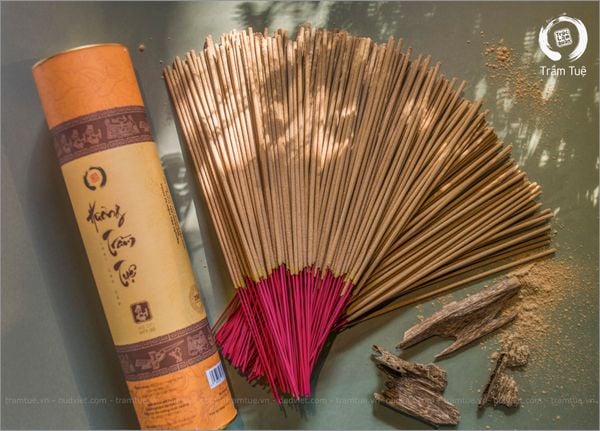
Inheriting the research achievements of scientists who have spent their whole life researching about Agarwood along with mastering the raw material area, Agarwood (Agarwood) has created clean agarwood products, without using any chemicals. fragrance, curd or preservative. Agarwood always puts CLEAN - TRUE - SAFETY criteria on the top because each incense stick is made from the quintessence of heaven and earth, not only for spiritual connection but above all for the benefit of the user. .
Customers with a history of allergic rhinitis or asthma after experiencing Tram Tue's products find that there are no longer negative reactions such as when using chemical scents, a pleasant respiratory system, and a pleasant body. more comfortable and have recommended to friends who also have respiratory diseases to use. This shows that if we don't detect and continue to use toxic odors, it will have an incalculable impact on health.


















